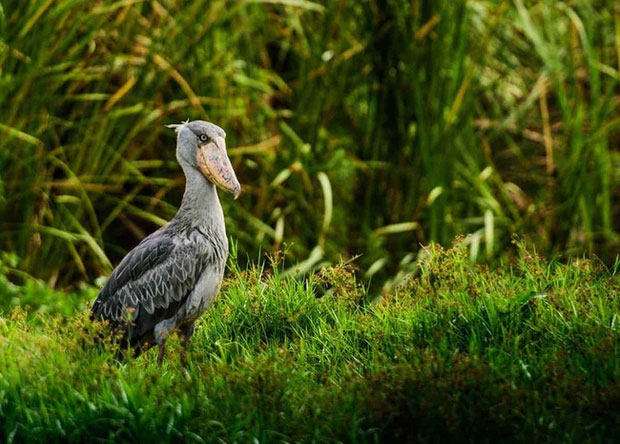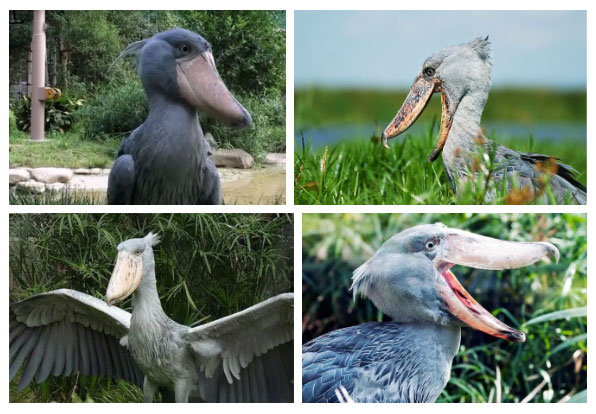The 'most ferocious' bird in the world: A natural enemy of crocodiles, possessing a 'difficult' face that knows how to stay away
Vast nature has a strange bird possessing a large beak and a fierce face, no one dares to approach. Overall the first part with the "rolling back" and "crying" eyes makes people feel terrible.
This bird has amazing strength and fearsome "cold-blooded" nature. It is the natural enemy, the natural enemy of the crocodile - the shoe-billed stork. I'm sure many people have seen them in zoos.
Shoebill stork - fierce bird with a special beak
Shoebill storks mainly live in the swamps of Africa, powerful in appearance and large in size, likened to dinosaurs in the form of birds.

Shoebill storks live mainly in the swamps of Africa,
Shoebill is a descendant of the small dinosaur "Theropoda" - the same group of dinosaurs T-Rex. Through evolution, the mouth full of sharp teeth was replaced by a beak.
The adult shoebill is 1.2 m tall and can weigh up to 4-7 kg. Their wings are very large and broad, with a wingspan of 230-260 cm. However, they cannot fly far and too high because their body weight does not allow it.
This bird has long legs, is the ideal model of many beauty lovers. Such a large body with long skinny legs looks a bit "limbed", but creates its own charm.

The beak of the shoebill stork is the largest in the world.
The most notable feature of the shoehorn stork is its impressively large, spotted bill and is approximately 0.12 m wide. The beak of the shoebill stork is the largest in the world, a bird with many uses, especially hunting and drinking beverages under the harsh African sun.
The front of the large and sturdy beak is bent into the shape of a hook. The beak with this special structure is very sharp, can penetrate the crocodile skin, even the edge of the bird's beak is razor sharp, cutting the prey easily.

Shoebill storks are solitary animals with a lifespan of more than 35 years
The Dutch also call the shoehorn stork "the father of shoes". Not that this bird invented shoes, or can make shoes, but because their beak is very similar to the wooden shoes of the Dutch.
Shoebill storks are solitary animals with a lifespan of more than 35 years. You only see this bird appear sometimes when they are in the breeding season in dry weather.
Natural enemy of baby crocodile
Shoebill storks have amazing hunting abilities. Their main food is fish, frogs and reptiles. Notably, this bird is a natural enemy of crocodiles, especially small crocodiles.

Shoebill storks have amazing hunting abilities.
Shoebill storks often stand motionless in the water with their beak pressed close to their chest, like a sniper waiting for an enemy to bite. The reason for the beak is often sagging, pressed close to the chest is because the weight of the bird's beak is quite heavy.
Baby crocodiles are still young, do not know the dangerous wild nature. They frolicked happily in the water, not realizing that they were in the sights of birds with large sharp beaks.
Aiming at the right time when there is no mother crocodile nearby, the shoe beak pokes its head into the water, when it lifts its head, there is a small crocodile in its mouth. The movement only happens in the blink of an eye, the speed is so fast that it is difficult for the human eye to catch up.
Successfully hunting, the shoebill is looking for a quiet place to enjoy his party.
The process of eating baby crocodiles is quite difficult, because they often swim into the grassy waters. With a thick and wide beak, the shoebill stork often eats baby crocodiles and mossy water grass. It will take more than ten minutes to remove all the weeds, but that's okay because this bird is very patient.


In addition to baby crocodiles, shoebill storks also like to eat turtles.
Crocodile skin is so thick that normal birds cannot eat it. However, the shoebill stork is not an ordinary bird, it possesses an extremely powerful beak.
For the shoe stork, the crocodile skin is just a chewy piece of cake, just a little bit of force and it will tear immediately. And yet, they also love to eat turtles and sturdy turtle shells are nothing with their large beaks and special digestive systems.
Due to various reasons, the number of shoebill storks is not much, the total number does not exceed 20,000 in the wild and in captivity at zoos, and has become an alarmingly endangered species.
Nature has a complete biological chain. Each animal has its own survival skills. Like the shoebill stork, although it has a large body and cannot fly very far, it is actually a natural enemy of the crocodile.
However, the biggest natural enemy of animals is humans. We are partly responsible for the sharp decline in the number of shoebills. Accordingly, humans should protect animals and live in harmony with nature. In recent years, surely all of us have felt that Mother Nature is angry. Act now before the Earth becomes irretrievable.
- Interesting things about crocodiles
- Scary people who watch diver confront the giant crocodile in Mexico
- Mozambique declared war on human-eating crocodiles
- Discover the world's most exotic pigeon
- Successful surgery for rare facial transplants in the world
- Mysterious place to see crocodiles like gods
- Catch giant crocodile weighing 500kg after finding a human body
- Survival of crocodiles and dinosaurs
- Reckless close to giant crocodiles for 15 years
- Video: A close-up of the giant princess crocodile
- Ancient crocodiles are vegetarian animals
- Shocking image of the scuba diver hypnotizing the world's most ferocious shark
 Animal 'suffering' after hibernation
Animal 'suffering' after hibernation Why do goats climb well?
Why do goats climb well? Scientists were surprised to see chimpanzees eating turtles
Scientists were surprised to see chimpanzees eating turtles Giant catfish died deadly due to drought in Thailand
Giant catfish died deadly due to drought in Thailand